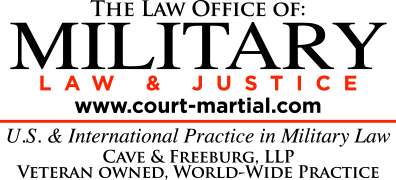Delay-Continuances
Do you and your lawyer need a delay--a continuance being the legal term here.
Good planning in advance of scheduling trial helps avoid the need for delay later on.
Keep in mind, the closer to trial when you ask for a delay, the less likely you might get one. Your military defense lawyer should already be aware of this.
As a military defense lawyer I have found that the main reasons for delay closer to trial are because the prosecution itself has not been doing their job efficiently. It's not uncommon for prosecutors to wait until a week or two before beginning their case preparation. At that point you and your military defense counsel can expect a flurry of "new" discovery. It's not new, it's just the prosecution's lack of diligence makes it just then provided--have your military defense lawyer hold their feet to the fire on this. Don't be shy about asking for delay and putting the blame where it lies!
But, you are preparing for trial, you conclude that a continuance is necessary, you request a continuance, and you lay out all the possible reasoning consistent with the Miller factors---denied.
Please don't don't let your lawyer do what two military defense counsel did in one case, which was to do nothing once the MJ denied their continuance request. See United States v. Galinato , 28 M.J. 1049, 1989 CMR LEXIS 488 (N-M.C.M.R. 1989).
In United States v. Miller, 47 M.J. 352 (C.A.A.F. 1997), and United States v. Weisbeck, 50 M.J. 461, 464 (1999), the CAAF set out a non-exclusive list of factors that a military judge should examine when deciding to grant or deny a continuance (either for the defense or the prosecution)
- Surprise.
- Nature of the Evidence.
- Timeliness.
- Substitute Testimony or Evidence.
- Availability of Witness or Evidence Requested.
- Length of Continuance.
- Prejudice to Opponent.
- Prior Continuances.
- Good Faith of Moving Party.
- Reasonable Diligence of Moving Party.
- Possible Impact on the Verdict.
- Prior Notice.
See also Francis A. Gilligan Frederic J. Lederer, Court-Martial Procedure § 18-32.00, at 704 (1991).
A careful military defense counsel will make sure that they have very good explanations for each of the above points. Keep in mind, that some lawyers gain a reputation for always wanting delay and being less than reasonably prepared--they are the ones who will likely have a hard time addressing items 9 and 10 above.
I'm not a Boy Scout, but I remember to be prepared.
Contact me for a free consultation on your case, and we can discuss how I can help you in your Article 32, trial, or appeal.
 The Law Office of Philip D. Cave Home
The Law Office of Philip D. Cave Home










